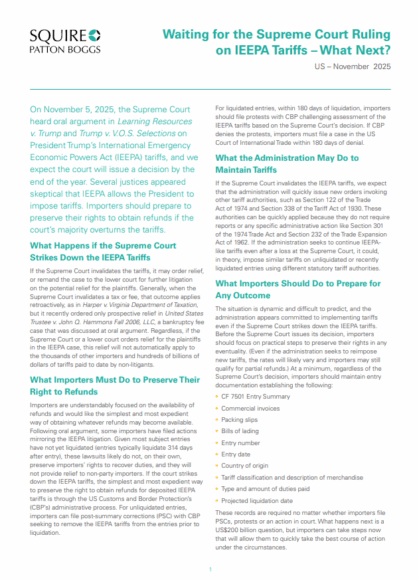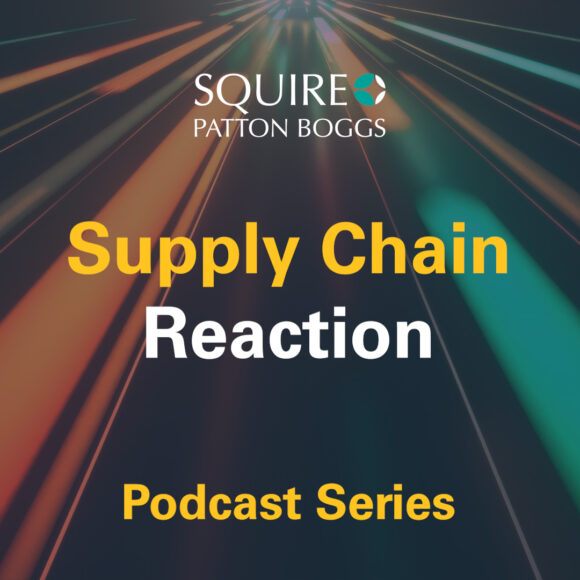Please contact: Tim Flamank or Francesco Liberatore with any questions.
Supply chain disruption remains a key risk in the semiconductor industry. Recent events have shown that even beyond high-tech corners of the sector, supply and demand dynamics over critical components, expertise and end products can change quickly and dramatically. The consequences for the automotive industry are potentially stark. In this alert, we consider some current trends in the semiconductor industry and suggest legal best practices arising from these. We show practical ways in which understanding and anticipating the legal risks of disruption can be a game-changer in mitigating its impact.
Export controls affecting key components
Export controls are the (if not one of the most) prominent topic of concern across international semiconductor supply chains at the beginning of 2026. Increasingly muscular government intervention across many major parts of the supply chain—from rare earths and advanced manufacturing machinery all the way through to finished chips—has given rise to disruption and uncertainty. Moreover, export control measures are no longer confined to the most advanced, AI-focused chips, with policies becoming increasingly inconsistent and difficult to predict. Many manufacturers are being forced to consider how government intervention might impact their operations and contractual arrangements.
The increasing prevalence of export controls are an obvious reminder of the importance of effective supply chain management. But it also highlights a number of other legal issues. We have written previously about how the performance of a contract itself may be affected by the introduction of regulations or export restrictions.[1] It is important to have a firm grasp on what the wording and governing law of your cornerstone supply contracts require when these events occur. Are you entitled to cease performance altogether? Is there a force majeure provision or legal doctrine that could avail you in this situation? Or are you likely to need to find some other way to continue discharging your obligations? If a contract cannot be performed as a result of the imposition of export controls, who is liable for the financial loss that follows? Is there a limitation of liability or exclusion clause that might apply? These are common, straightforward issues arising from the imposition of export controls specifically. Frequently, they are given little thought until worst has happened, by which time the benefits of engaging with them in advance are lost.
Looking beyond the contracts immediately affected, it may be necessary to consider the impact on your wider commercial relationships. Disruption at one level of the supply chain can quickly reverberate vertically if actors at different levels are partially or wholly reliant on each other. Where a party is informed by a supplier that crucial components cannot be delivered, what exposure does that party then have to its own customers if its delivery obligations to them cannot be performed? These are quintessential supply chain problems that again require engaging with—and understanding—the wording of your key contracts. This will provide a realistic idea of risk exposure and even potentially allow space to negotiate solutions to problems before they arise. This is particularly useful as the risks associated with export controls become more prevalent.
Interdependence and integration across semiconductor supply chains
International semiconductor supply chains are complex and often highly concentrated. Very often, the production of key components, equipment or manufacturing processes are dominated by one or a handful of companies worldwide. This means that commercial disputes that are in the first instance confined to two counterparties can have ramifications up and down the supply chain. And as parties now take steps to diversify customer or supplier bases away from what have, at times, been essentially exclusive relationships, commercial tensions at all parts of the supply chain are growing. This is before one considers the ever-present risks associated with technology transfer and IP theft that have been a longstanding feature of the semiconductor industry. This more febrile business environment presents its own challenges.
Insofar as disputes under one’s own contracts are concerned, time-honoured steps hold true. Commercial relationships are not always plain sailing, and disagreements can occur even between established partners. Of course, most businesses will want to resolve a disagreement without engaging a court or arbitral tribunal. But as the stakes rise, that may not hold true as much as it has done in the past. There is therefore real value in having a clear understanding of the legal position, the starting point for which will invariably be whatever contractual documentation underpins the relationship. For example, collaboration or joint venture agreements are becoming more common in semiconductor or adjacent sectors, as more manufacturers seek to mitigate supply risks by directly participating in chip research or manufacturing. These types of contracts often contain general provisions targeted at securing broad-based cooperation. They may involve considerations of good faith, the treatment of which can vary between different legal systems. How these obligations regulate a party’s actions can be complex and difficult to quantify, but behind this superficial uncertainty can lie strategic advantage. Gaining a good grasp of what such provisions will require both generally and in a particular factual situation can reduce the risk of spontaneous actions that end up affecting the legal relationship in unintended ways (e.g. a rash statement to the other party, which inadvertently amounts to a repudiation, concession or waiver of liability).
Consider a situation one step removed, where a counterparty claims to no longer be able to perform your contract on account of a dispute it is involved in with one of its suppliers or customers. What are your contractual entitlements in that situation? Do you need to continue performing your obligations, or are you entitled to suspend performance, or even bring the contract to an end? Making the wrong move can obviously have severe consequences. At the same time, there may be strategies available that can help effectively mitigate the impact of disruption—or at least provide you with greater control or leverage over the situation. On a practical level, force majeure is frequently relied on by parties whose onward obligations are jeopardised, but (as we have previously written) the applicability of this doctrine is not a given.[2] Likewise, it is sensible to consider carefully the default and termination provisions of a contract—including any provisions surrounding notification or giving an offending party the opportunity to cure—before taking more drastic steps. We expect to see these sorts of consideration become more common as the risks of disruption reverberate through the semiconductor industry.
Reorientation of chip manufacturing capacity and knock-on effects to the wider market
Finally, rapid expansions in technology can affect parallel markets, often in unanticipated ways. The recent, dramatic uptick in demand for memory chips provide an illustration of this. Developments in AI have created increased demand for these types of chips, which specialise in the storage and retrieval of information. Producers of the most cutting-edge generations of memory technology have found this lucrative, commanding high margins for their products. Prices have risen and supplies have become overbooked. However, some within the market are now reporting bottlenecks for less sophisticated memory products as well, as producers look to repurpose existing manufacturing capacity towards the more complex, lucrative designs, thus reducing the output of these more established products. This has led to increasing price pressures in even these more commoditised parts of the market, which had not too long ago witnessed oversupply and fierce price competition. This can pose a new procurement problem for traditional manufacturing industries where these legacy chips are still widely used. A shift to a buyer’s market, with longer-term contracts and higher price levels, recalibrates incentives for parties with pre-existing relationships or contracts.
While cyclical price changes are not a new phenomenon in chip markets, they do provide a further reason to consider the detail in your contract. Is your price mechanism clearly defined, and if you are now contracting over a longer-term (for example to lock in favourable pricing), have you considered how you might be affected if the market shifts back into oversupply during this time? If price swings would leave you out of pocket, have you explored ways that you could mitigate this, for example through tiered adjustments to the price mechanism or greater offtake flexibility? These points can be key drivers of commercial value but may also be overlooked by parties who are used to contracting in a more short-term, ad hoc way.
These examples demonstrate the value that can be obtained by actively engaging with legal risk. Understanding the contractual frameworks that your most important commercial relationships are based upon, and how they intersect with your business and the surrounding market, can bring significant upside. That is particularly the case for the semiconductor industry, where risks to supply chains are wide-ranging and difficult to quantify in advance.
Practical advice
What are the takeaways from the above?
First, think proactively about commercial risk. Being able to identify areas of supply chain vulnerability in advance is better than finding out about them after the worst has happened.
Second, actively cultivate an understanding of your contractual relationships. This is helpful even if you consider these documents to be pro forma, or standard-form contracts that are not open to extensive negotiation. Understanding the scope of your legal obligations and entitlements is a critical tool in navigating disruptive events effectively. Engaging with legal advisors in periods of relative tranquillity is an excellent way of maximising these benefits. Engagements of this nature may be scoped to avoid significant outlays on fees.
Third, consider the legal tools that are available to you in advance of disruption. Do you have flexibility rights or obligations that are not being utilised effectively? Does your contract provide for good faith discussions or negotiations in a way that you could use to your advantage? If you are concerned that a contract will become unworkable if circumstances change, is this something you could be proactively raising with your counterparty now, rather than later, when a different commercial dynamic may make it more difficult? Are you comfortable with the logistics of enforcing your contract, or having it enforced against you? While these are all ultimately legal questions, the answers can give valuable commercial insight, or leverage, to a business in a potentially volatile sector. Thinking about these questions before they reach your inbox amplifies these benefits.
Fourth, and finally, engage professional advisors swiftly and proactively when crises do occur. Time is a valuable commodity, and it is common in commercial disputes to see a company’s legal position made worse by knee-jerk reactions. Is your counterparty presenting you with an interpretation of your contract that does not align with how you read it? Ultimately, having trusted advisors who already understand both the market environment and your business can pay substantial dividends by allowing you to defend your legal position more quickly and effectively than would be the case by instructing advisors from scratch.
It is true that these practical steps could be applied to most industries. But the industry-specific issues we have considered in this article are rooted in current market developments in the chip sector. Political intervention, market volatility and the prospect of cross-border disputes are all risks that can be mitigated through better understanding and forward planning. At the start of a new year, the lessons provided by these kinds of events are as clear as they have ever been.
We are a global law firm with expertise across all major sectors, regions and jurisdictions. We are able to advise clients managing supply chain risk and international disputes quickly and effectively to deliver the most beneficial outcome for your business.
For questions on the contents of this blog post or if you would like to discuss any projects in confidence, please contact Squire Patton Boggs Automotive & Transportation Industry Group.
[1] Where Are My Chips? Avoiding and Resolving Disputes in the Chip Industry, Squire Patton Boggs, October 2024; 2023 Legal Trends in Chip Industry Markets, Squire Patton Boggs, April 2023; Avoid Contract Disputes From Export Controls in Chip Industry, Bloomberg Law, December 2022.
[2] Ready for Anything – Understanding Force Majeure in an Uncertain World, Squire Patton Boggs, April 2025 (https://www.squirepattonboggs.com/insights/publications/ready-for-anything-understanding-force-majeure-in-an-uncertain-world/).







